Iran says exporting radiopharmaceuticals to Europe, India
Iran’s nuclear chief has highlighted the country’s achievements in the field of nuclear medicine, saying Iran is now exporting its homegrown radiopharmaceuticals to several countries in the world.
Ali Akbar Salehi, the head of the Atomic Energy Organization of Iran (AEOI), said India, Lebanon, Iraq, and some European countries are among customers of Iranian radiopharmaceuticals.
In the near future, he said, Iran will turn into a major exporter of radiopharmaceuticals in a wider scale, as the number of Iranian-made radiopharmaceuticals is increasing every year.
Speaking in a televised interview on Saturday marking the National Day of Nuclear Technology, Salehi referred to Lutetium-177 as one of the domestically-developed pharmaceuticals unveiled on Saturday, and said every single dose of Lutetium-177 can cost prostate cancer patients 15,000 euros if they are bought from other countries.
He said Iran is prepared to move forward in the nuclear industry, and is on the verge of industrializing nuclear energy.
“Iran is now competing with Argentina, Brazil, Pakistan, and India,” he said, highlighting the country’s design and development of research reactors.
“Based on the law approved by the Parliament, we should prepare and install 1,000 IR-6 centrifuges, and we are working on that… Today we have increased our uranium enrichment capacity to 16,500 SWU, and we are moving forward with slow and calculated steps,” he added.
According to Salehi, Iran currently has 15 types of centrifuges including IR-8, IR-9, IR-S, IR-5, and IR-7 as well as a full cascade of IR-6 which has been launched.
Salehi’s comments came a few hours after the Iranian president unveiled 133 new nuclear achievements made by the country’s experts in different areas of the nuclear industry, including quantum, enrichment, heavy water and deuterium compounds, radiopharmaceuticals, lasers, etc.
In a video conference call earlier in the day, President Hassan Rouhani unveiled the nuclear achievements in the provinces of Tehran, Markazi, Isfahan, Alborz and Qom to mark the 15th anniversary of the National Nuclear Technology Day.
On his order, Iranian experts began injecting gas to a new generation of centrifuges at Natanz enrichment facility. Iran also began the mechanical testing of IR-9 centrifuges and launched an assembly line for its new generation of centrifuges.
“Today, a chain of 164 IR-6 centrifuges was launched. It can provide us with products 10 times more than the former chain. This means the former centrifuges were at most 1 SWU (Separative Work Units), but the new series is 10 SWU," Rouhani said.
Moreover, "we have developed the IR-9 centrifuge with the capacity of 50 SWU which can provide us products 50 to 60 times more than the old centrifuges," Rouhani added.
The event also marked the unveiling of a number of radiopharmaceutical products, which Rouhani described as very important.
Iran showed to the world the peaceful nature of its nuclear program by signing the Joint Comprehensive Plan of Action (JCPOA) with six world states — namely the US, Germany, France, Britain, Russia and China — in 2015. The nuclear deal was also ratified in the form of a UN Security Council Resolution 2231.
However, Washington’s exit in May 2018 and the subsequent re-imposition of unilateral sanctions against Tehran left the future of the historic agreement in limbo.
Tehran remained fully compliant with the JCPOA for an entire year, waiting for the co-signatories to fulfill their end of the bargain by offsetting the impacts of Washington’s bans on the Iranian economy.
As the European parties failed to do so, Tehran moved in May 2019 to scale down its JCPOA commitments under Articles 26 and 36 of the agreement covering Tehran’s legal rights.
Trump used presidency to pocket $1.4 billion in first year back in office: Report
EU divided over new Iran sanctions
China hits US with economic counteroffensive after Maduro’s abduction: Report
Ben-Gvir arms more Israeli settlers amid rising violence in West Bank
'Hands on trigger': IRGC warns US and Israel against any miscalculation
VIDEO | US and Israel’s failed terrorism
After Venezuela, Trump sets sight on Cuba for 'regime change': Report
Trump’s ‘bulldozer’ diplomacy is deepening US-France rift: Analyst












 This makes it easy to access the Press TV website
This makes it easy to access the Press TV website